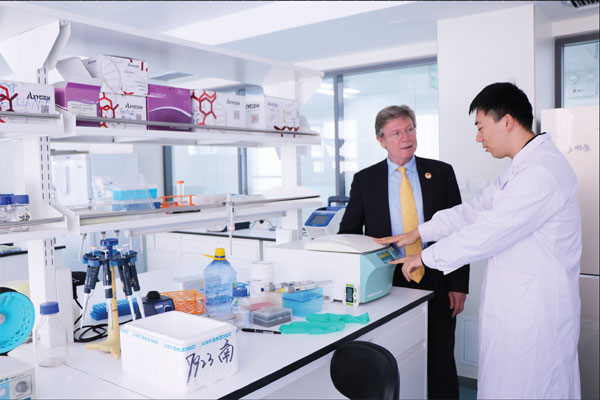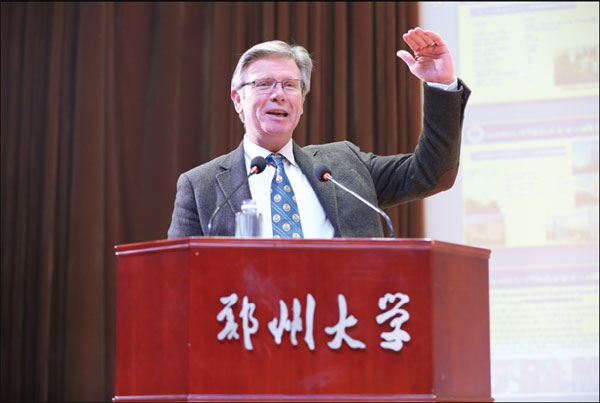Medical man on a mission

From studying cancer to helping establish a joint research center in China, renowned expert Nicholas Lemoine is not one to give up
Nicholas Lemoine says China's opportunities and challenges are its attraction.
The 60-year-old British medical expert has been the dean of the Academy of Medical Sciences at Zhengzhou University, in the capital city of Central China's Henan province, since 2015.
| Nicholas Lemoine has been the dean of the Academy of Medical Sciences at Zhengzhou University since 2015. The British medical expert devotes his time to reforming the school's management system and promoting its international cooperation. Photos Provided to China Daily |
He's a renowned expert in molecular oncology, gene therapy, translational medicine and management of medical institutions. He is a fellow of both the Academy of Medical Sciences and the Royal College of Pathologists in the United Kingdom.
He also serves as the director of the Barts Cancer Institute in the UK.
Lemoine has published nearly 300 papers in various publications, which have won him more than 20 international academic awards.
He first visited China in 1989, when he was invited to give lectures at a few hospitals in Beijing. He didn't return until 2005, when one of his colleagues who had a connection with Zhengzhou invited him to visit.
He had a chance to meet with Henan's provincial governor and forged a good relationship with the president of Zhengzhou University, who was keen on developing international links.
Lemoine was invited to be a guest professor at the university. With his help, the university soon established the Sino-British Research Center for Molecular Oncology with Queen Mary University of London in 2006.
Lemoine has led the center in research in such areas as oncolytic virotherapy, individualized molecular diagnosis and treatment.
The center has garnered more than 16 million yuan ($2.4 million; 2 million euros; £1.8 million) in funding. It has published 25 high-level papers and has been granted three patents.
"It's more than 10 years old and has had some really exciting discoveries," Lemoine says.
In 2014, the center was approved by the Ministry of Science and Technology as a national-level joint research center for cell and gene therapy - the first in this field in China.
Lemoine is excited about his current work as the dean. He has had the opportunity to completely redesign the school by drawing from advanced international management systems.
"The management has been the exciting part of what the last two years have been about," he says.
The new system has different management and evaluation methods for research platforms and staff, and he intends to help the university construct an international "talent zone".
He says progress has been much quicker than he imagined, and he is impressed by the speed of "making things happen" in China.
But life is not without challenges, he admits.
He has to deal with the management of human resources, particularly with the current quota system that, he believes, makes it difficult to change people's working styles.
So he has made special efforts to bring in international faculty.
He has also brought several influential international medical experts, including Australian Nobel-Prizewinning physician Barry Marshall, to work for the academy's research centers.
The school has more than 1,000 international graduate and undergraduate students in medicine.
Such an international environment can help the faculty become more competitive and benefit the students by exposing them to different cultures, he believes.
He is happy that he has been able to assemble a good team of committed people to support his venture, and the university president has been very committed to the internationalization agenda.
"I'm two years into this now, and I am not going to give up," he says of the reforms.
"Other parts of the university are looking at this and recognizing that this is a good thing."
His colleague Sun Xuelian appreciates the culture and ideas Lemoine is trying to spread among the co-workers.
Lemoine plays his role as a "serving leader" and has encouraged initiative among the employees, Sun says.
"He gives us no tasks, but a direction instead, and leaves the rest to us," Sun says, adding that he only gives them suggestions based on his experience.
Despite the challenges, Lemoine finds there are special advantages to undertaking research in China.
His school has eight affiliated hospitals in Zhengzhou - and one is among the largest in the world.
"It's an enormous opportunity for me as a clinical researcher, with its huge number of patients," he says.
His priority is to understand and design new ways to prevent and treat some common cancers in the region and let the clinical application of their research results directly benefit the local people.
Lemoine has made special efforts to increase the university's international exposure, by helping it organize international conferences, such as the 2017 Esophagus Prevention International Conference held at the university. It brought together more than 300 medical professionals from China and abroad.
With his assistance, the university is collaborating with influential international counterparts, including Cambridge University.
In the past few years, he has helped Zhengzhou University arrange for about 10 young scientists and doctors to train in the UK.
In recognition of his contributions, Lemoine was given the Friendship Award by the Chinese government in October.
The award is the highest honor given to foreigners who have made significant contributions to the country's social and economic development. Lemoine spends more than half of the year in Zhengzhou and keeps a busy schedule.
He admits that the decision to divide his time between two sides of the world was not easy. "But I think it's the right decision. Most of the time, things work out fine when you are doing the things for the right reason and when you have a vision," he says.
His department has won four national science grants. It also received one international joint funding deal in 2017.
Meanwhile, its new international-level research platform for basic research and translational medicine, set up with an investment of nearly 200 million yuan, began operating recently.
And he intends to establish a network of medical schools in China to tackle the main challenges the nation faces in medicine.
liuxiangrui@chinadaily.com.cn
| Nicholas Lemoine has made great efforts to increase Zhengzhou University's international exposure. |
(China Daily European Weekly 12/01/2017 page21)
Today's Top News
- Wang calls Rubio meeting constructive
- Tianzhou 9 cargo craft transported to launch site
- Gaokao not only way to be successful in life
- More policy options in H2 to spur growth
- Shipping industry advances green efforts
- China supports Egypt in playing a bigger role
































